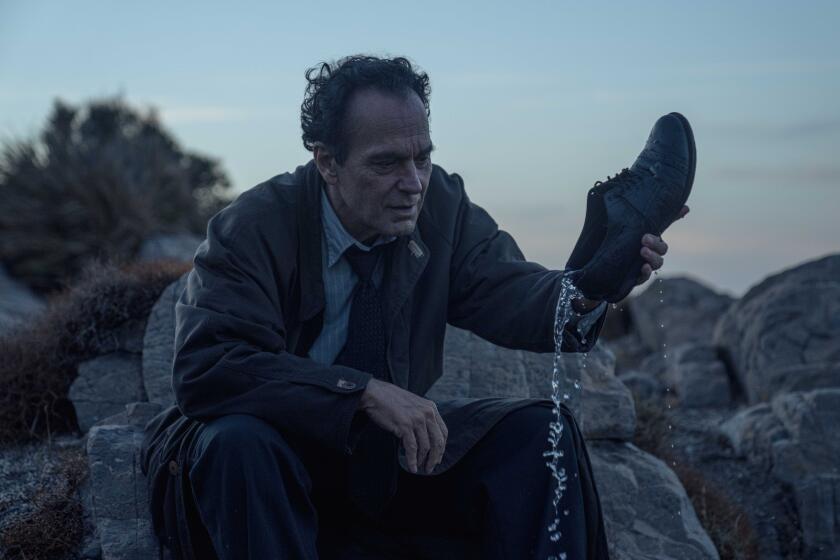Floating portal to the twilight zone
“The Lost Room,” a six-hour miniseries from the Sci-Fi Channel about a mysterious other-dimensional motel room and its former contents, is a long ride to nowhere but with some nice scenery and exciting turns along the way. If ultimately frustrating and fickle as regards even its own invented rules of supernatural physics, taken simply as a thing to watch, it’s pretty enjoyable. Indeed, that is almost the definition of a Sci-Fi Channel miniseries.
The hazy premise is that something happened in a New Mexico motel room in 1961 that charged all the ordinary objects in it -- a pen, a pencil, a bus ticket, a pair of scissors and so on -- with various special powers, and that, although the room itself has disappeared from this plane of reality, it exists as a floating portal accessible through any door opened with its old key. (This concept allows for such entertaining dialogue as, “Watch out! He’s got the comb!”) Competing cabals and various lone rangers are after these objects -- for reasons variously righteous, nefarious, lunatic -- although how one would be able to locate, say, one special pen or pencil among the millions or perhaps billions in circulation is just one of many things not really explained here.
Peter Krause is a Pittsburgh police detective into whose possession the all-important key accidentally falls, making him a target of the object hunters. After his partner is shot and his daughter disappears through the room into some other inaccessible dimension, he also becomes a fugitive and a seeker. Along the way to the film’s last frame, he meets and occasionally collaborates with an array of well-played if not deeply imagined characters, including Julianna Margulies as a “good” object hunter and Kevin Pollak and Roger Bart as bad ones, the first the type of mad millionaire common to the genre and the second a gangsterish ex-philosophy teacher nicknamed “The Weasel.”
Dennis Christopher, no stranger to such roles, is a forensic expert who, having got a whiff of the power of the key, goes Gollum in no time flat. (It’s nice to see Ann Cusack as his wife.) Peter Jacobson is especially good as a luckless schlub who possesses a bus ticket that transports anyone it touches to a spot outside Gallup, N.M. (conveniently, as it turns out). A reluctant guide for Krause’s character, he makes his portion of the nonsense especially believable.
Films like this work on misdirection, by keeping you from thinking more thoroughly about what’s going on than the writers have. Characters know whatever it is convenient for them to know, rather than possible or likely; the rules of the mythology are also amended as necessary. There are charts and maps that have only the authority of having been put in front of you, and the script gets a lot of mileage out of “no one knows” and “some think,” as in “No one really knows how or why they came to be,” or “Some people think that God died and that all these objects are little pieces of his corpse .... [Some] think that some part of the universe broke down and it’s just physics gone haywire, and some other people think that God’s alive and that this is some kind of text and they’re all out trying to collect all the objects like pilgrims looking for relics during the Middle Ages.”
There are bits of “The Lord of the Rings,” “The Maltese Falcon,” “Raiders of the Lost Ark,” “The Da Vinci Code” and, in one repeating bit of business, “Being John Malkovich” to be picked out here, although fundamentally it’s a video game: Collect the objects you need to defeat your enemies, advance to the next stage, solve the puzzle, and it’s no surprise to learn that co-creator Paul Workman is a computer science grad from Carnegie Mellon, where he and a friend first “developed the story and mythology of ‘The Lost Room’ while working in the library.”
In the end, nothing -- or nothing much -- is revealed. Krause’s particular story does resolve -- that is, the question of whether he’ll get his daughter back. (But I think you already know the answer to that one.) Ultimately, there is no more explanation of how the room got lost or why a comb should be able to stop time, for example, than how those beans Jack traded the cow for got to be magic. This feels like a bit of a cheat, given the investment of time, and yet there’s something honest about it as well: Any explanation would be as arbitrary as the rest of it.
*
‘The Lost Room’
Where: Sci-Fi Channel
When: 9 tonight
More to Read
Only good movies
Get the Indie Focus newsletter, Mark Olsen's weekly guide to the world of cinema.
You may occasionally receive promotional content from the Los Angeles Times.







